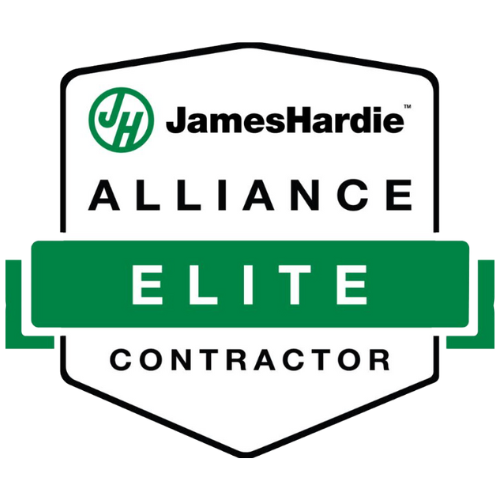Text or Call
Storm Damage Repair
While vinyl siding may be installed for a lower price point than fiber cement siding, the pros here at American Way Exteriors have noticed its problems can cause homeowners to regret this choice.
Some common vinyl siding problems include:
Although there are drawbacks, some positive things remain about vinyl siding. Made of PVC, the same material used in luxury vinyl floors, today’s vinyl siding has some perks such as:
You can replace your vinyl siding with James Hardie siding. Fiber cement siding replacement comes with a long list of pros, and the only con most people see is its initial investment. It is a more sizable initial investment than vinyl siding, but it provides long-term reliable high performance for decades, saving you money in the long run. And it looks fabulous!
James Hardie siding—the most popular name when it comes to fiber cement—is also known as Hardie Board and HardiePlank. It is the #1 siding material in America, and known for its strength, attractiveness, and durability.
Here are some of our favorite perks when it comes to James Hardie fiber cement siding:
Fiber cement is made of cement, sand, and cellulose fibers. These ingredients combine to create heavy-duty, dependable siding that stays put in severe weather.
Five times thicker than vinyl siding, fiber cement gives your home substantial fortification. While vinyl gives the impression of being thick, it actually has an empty space under it once it’s installed. Fiber cement siding is so thick it can mimic the look of wood.
When siding materials fail, unwanted water penetrates and can wreak havoc in your home—causing wood rot, mold, and mildew. Avoid the need for repairs by investing in durable fiber cement siding which stays unharmed once it is installed. It won’t crack or incur holes in it, so moisture is kept outside your siding where it belongs.
The extra benefit of James Hardie’s ColorPlus® Technology gives homeowners baked-on color that resists fading, keeping your siding looking gorgeous with minimal maintenance. Its UV resistance keeps it from fading so your siding continues looking great for years to come.
James Hardie’s HardiePlank lap siding is backed by the prestigious Good Housekeeping Seal. The highly respected Good Housekeeping Seal is only given after a product’s rigorous evaluation and testing by the Good Housekeeping Research Institute. With modern equipment, siding is tested for fading, weather, water, fire resistance, and more.
The James Hardie company studied the long-term impact a variety of climates have on siding. Their research resulted in the creation of the HardieZone system, which ensures you get the best siding product for your region. Their HZ5 products resist wet and below freezing weather, while the HZ10 products protect homes from the sun’s harsh effects along with high winds, heat and humidity.
The James Hardie company is so confident in its siding, it offers the best warranty in the industry. The 30-year non-prorated, transferable warranty gives homeowners confidence in their fiber cement siding’s performance for years to come. And this durable siding can last up to 50 years!
The safety of your family is of utmost importance, particularly in the case of a fire. While vinyl siding melts and wood fuels a flame, fiber cement siding is heat resistant and fire resistant, and won’t contribute to a fire. Due to its outstanding properties, some insurance companies even offer discounts for fiber cement siding.
Upkeep on your home’s siding keeps it looking in tip-top shape. One of the great things about James Hardie fiber cement siding is its low maintenance requirements over the years. Imagine how much time you will save because you don’t have to regularly paint or repair your home’s siding.
American Way Exteriors is an award-winning siding and roofing and contractor in Dayton, OH. We stay on the cutting edge of technology and manufacturer’s best practices so you know your siding and roof installation is done right the first time.
When your siding needs a replacement, we would love to help. Get a quote today so you can be one step closer to your dream home!
American Way Exteriors has earned numerous positive reviews for our outstanding service. Read about our customers’ pleasant experiences working with us, then contact us today to learn how we can improve your home with new siding and roofing.








